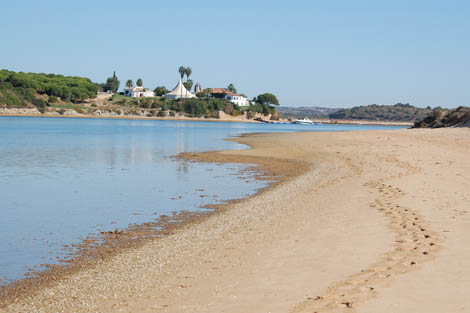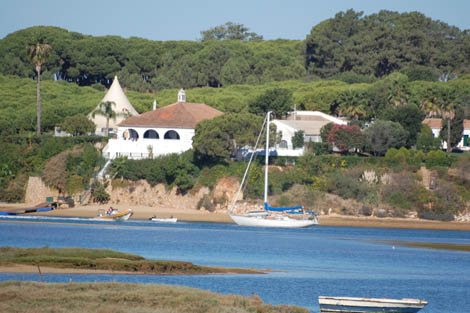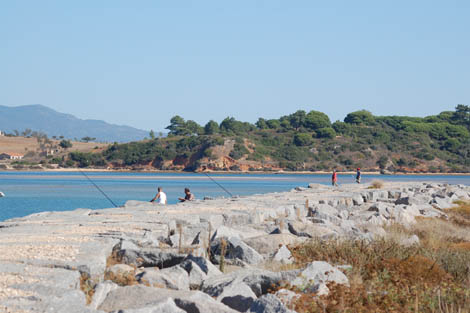 The Loulé Administrative and Fiscal Court condemned the owners of Quinta da Rocha, in the Ria de Alvor, to the complete restoration of the habitats they had destroyed, in a decision that the six Non-Governmental Environmental Organizations (NGOs) that filed the complaint consider «historic for Portuguese environmental law».
The Loulé Administrative and Fiscal Court condemned the owners of Quinta da Rocha, in the Ria de Alvor, to the complete restoration of the habitats they had destroyed, in a decision that the six Non-Governmental Environmental Organizations (NGOs) that filed the complaint consider «historic for Portuguese environmental law».
The ruling, dated May 25, obliges the owners – the company Butwell Trading, Serviços e Investimentos SA, owned by Aprígio Santos – to restore all destroyed species and habitats, thus re-establishing all the conditions that previously justified the high protection status in this property located in the heart of the Ria de Alvor.
The ruling also obliges the owners to completely ban activities in the areas of protected habitats for 10 years (thus giving the marshes conditions to recover) and to submit to the ICNB and implement a recovery plan for the protected species destroyed on the property.
According to the Ria de Alvor Monitoring Group – formed by the associations A Rocha, Almargem, Geota, LPN, Quercus and SPEA -, “after years of complaints, notices and administrative offenses for the destruction of species and habitats with the highest levels of environmental protection (national and community) in this property, the court finally gave as proven all the facts that had been denounced by the NGOs and by local inhabitants».
Marcial Felgueiras, leader of the association A Rocha in the Algarve, and who witnessed at first hand the destruction that, in 2006, was carried out, especially in marsh areas, in Quinta da Rocha, underlined in statements to the Sul Informação that this is “the first conviction made in Portugal, after more than 30 years of existence of the environmental law”.
"We consider that the fact that the court decrees the obligation to restore the original situation in the destroyed areas is much more effective than the application of any fine, which is easily accountable and absorbable in the project's budget," added Marcial Felgueiras.
 The six NGOs stress that “this was a case that threatened to end like almost all other cases of destruction of protected areas in the Algarve and the rest of the country. With the fact (the destruction of habitats) accomplished, the way is almost always open for, after the payment of small fines, millionaire deals can be made with land that was bought very cheaply, precisely because it could not be urbanized».
The six NGOs stress that “this was a case that threatened to end like almost all other cases of destruction of protected areas in the Algarve and the rest of the country. With the fact (the destruction of habitats) accomplished, the way is almost always open for, after the payment of small fines, millionaire deals can be made with land that was bought very cheaply, precisely because it could not be urbanized».
However, "there is an effective antidote to these practices and that antidote has now finally been applied by the courts, forcing owners to restore all destroyed species and habitats."
According to the Monitoring Group, "the fact that an administrative court condemns an individual, forcing him to take concrete measures to restore the environment in favor of the public interest, constitutes a considerable advance and could have a very significant impact on Portuguese environmental law".
"This type of sentence, which, although provided for by law, is rarely applied, is the only way to reverse and combat the policy of fait accompli, as it requires the effective restoration of public interests that were harmed."
Alexandra Cunha, president of the national board of the League for the Protection of Nature (LPN), also expressed her satisfaction with this “fair decision, which shows that it is worth fighting, using the instruments that justice gives us”.
The LPN leader only regretted that "justice is so slow in Portugal", stressing that the case was brought before the courts in 2007, only now, five years later, to hear the first court decision. "But better late than never," said Alexandra Cunha.
The Ria de Alvor Monitoring Group also highlights, as a «remarkable aspect», «the collaboration and synergy of several NGOs», authors of this process, with scientists from various Universities and Public Administration entities (with particular emphasis on the ICNB and the CCDR-Algarve), and the GNR's SEPNA, "who were willing not only to witness the destruction, but also to point out the path and methods for restoring the destroyed habitats".
In the case of universities, Marcial Felgueiras highlights those in the Algarve, Coimbra, the Azores, as well as the Lisbon Botanical Gardens and even the University of Cambridge, in England. "All these academies were available to collaborate, not only testifying, but also providing material, from their archives or herbaria, which constituted evidence in this case."
Considering this process as “a repetition of the story of David against Goliath”, the Monitoring Group considers that “the Ria de Alvor is this time a case of hope, which encourages the rest of the country to fight for a truer environmental right. effective, with the real protection of what everyone agreed was too valuable to be destroyed».
«This was really a true case of David against Goliath: you cannot compare someone who has 15 million to invest in the purchase of a property like Quinta da Rocha, with the six organizations that have small budgets and that fight every day to be able to do a lot with the little money and resources, even human resources, at their disposal», stressed Marcial Felgueiras. "Fortunately, once again little David managed to turn the situation around."
The NGOs consider that now, «during the next ten years, the Ria de Alvor will have an opportunity to find other models of economic development, whose legacy is not only concrete and easy profit, but also life for local populations in a truly regional economy. sustainable'.
 Marcial Felgueiras underlines that the sentence “was not so much a victory for the NGOs, but above all for the population, which must be celebrated by all, since this way the preservation of an environmental wealth that can be enjoyed by all was achieved”.
Marcial Felgueiras underlines that the sentence “was not so much a victory for the NGOs, but above all for the population, which must be celebrated by all, since this way the preservation of an environmental wealth that can be enjoyed by all was achieved”.
As for the recovery plan to which the owners are obligated, and which must be submitted within six months to the ICNB, the CCDRA and the Chamber of Portimão (deadline that will be interrupted if the owners, as expected, file an appeal), the The leader of the A Rocha association stressed that “when we prepared the action, we were careful to say that this repair should be done as cheaply as possible, without the need for large investments”. Because, he explained, "with small quasi-surgical interventions, the marsh will recover naturally, because nature has great resilience."
In the end, says Marcial Felgueiras, «even the owner can benefit from this, as he will get a longer return on his investment, if he knows how to take advantage, in a sustainable way, of the great environmental wealth that is that property».
Alexandra Cunha, president of LPN, stresses, in conclusion, that "it is now necessary to define who will inspect and monitor on the ground what is done by the company to restore the previous situation". But until that stage is reached, and taking into account the most likely recourse, it will still be a long time...
Aprígio Santos already sentenced to 2 years and fine of 150 euros
In another process referring to the same destruction of natural habitats in the Ria de Alvor, the businessman Aprígio Santos had been convicted, last February, to two years in prison, with a suspended sentence, for a crime of damage to nature and for the practice of crimes of disobedience in the Ria de Alvor, in a sentence handed down by the Criminal Court of Portimão.
The businessman, as administrator of the company Butwell Trading, Serviços e Investimentos SA, which owns Quinta da Rocha, in the heart of the Ria de Alvor, was also sentenced to pay a fine, payable in six months, of 150 thousand euros, which should revert in favor of Almargem – Association for the Defense of the Cultural and Environmental Heritage of the Algarve.
Butwell has appealed this conviction, as, predictably, it will do in relation to the Loulé Administrative and Tax Court ruling.
Case dates back to 2006
The case dates back to 2006, when on March 13, Associação A Rocha, which is headquartered in the Ria de Alvor, made the first complaint to authorities about the destruction, by machines at the service of Butwell, of vast areas of marsh and another vegetation cover at Quinta da Rocha, areas under the responsibility of the Natura Network due to the importance of their habitats.
Despite the accusations that followed, and the instigation of at least nine administrative infraction proceedings by the Commission for Regional Coordination and Development, the owners of Quinta da Rocha continued to carry out the mining, harrowing and removal of vegetation, altering vast areas of the property.
One of these mines was even being carried out at the end of the afternoon of a day in November 2007 when leaders of the A Rocha Association and the League for the Protection of Nature visited the site, accompanied by senior officials from the Nature Conservation Institute – the director of the Department of Hazardous Areas Management in the South João Alves and by the director of the Department of Hazardous Areas of Wetlands Maria João Burnay -, who immediately witnessed the illegal works in progress there.
Read here, in full, the judgment of the Administrative and Fiscal Court of Loulé.


















Comments